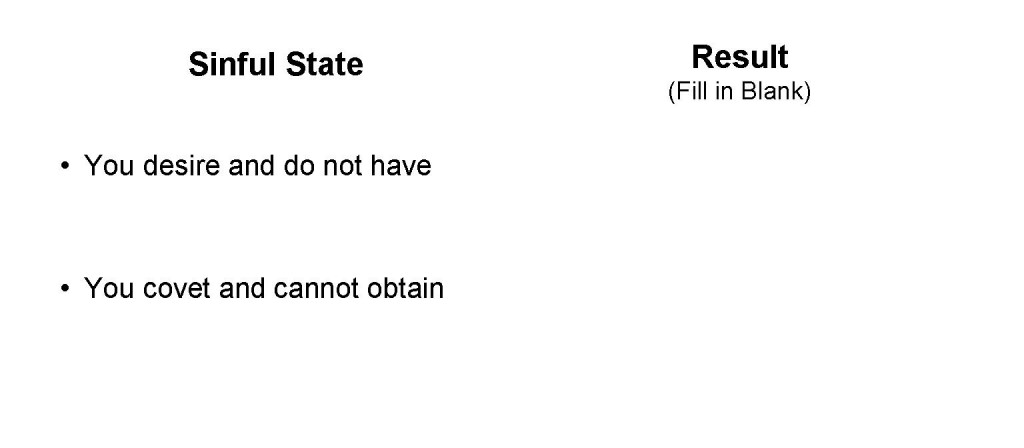James chapter four discusses a subject that is as relevant for us today as it was in the first century: quarrels and fights in the Church. St. James ended chapter three by telling his readers, “The harvest of righteousness is sown in peace by those who cultivate peace” (3:18). Then, “what is the source of quarrels and conflicts among you? Is it not this, that your passions are at war within you?” (4:1).
– Now reverse the process.
Read James 4:2-5
– James says they do not receive because “they do not ask.” What does this say about the faith-life of his first readers/hearers?
– James then says that when they do ask, they “ask wrongly.” What does this say about the faith-life of his first readers/hearers?
– James then says that what they do have, they are using to do what?
– What is James’ conclusion? Who are his first readers/hearers?
– Why are they adulterers?
The Solution
Read James 4:5
The Greek word pneuma can mean either spirit or Spirit. So, James could be talking about a person’s own spirit or God the Holy Spirit within a Christian. Immediate context favors that James is speaking about the Holy Spirit, since the subject of the verbs in the following verse is God.
Here is how I (your pastor) translate verse 5: “The Spirit, whom He made to dwell in us, yearns enviously.”
Read Romans 8:9-11 and 26-27
– What does the Holy Spirit “yearning enviously” within us mean?
– So, what is the Holy Spirit doing within us?
Read James 4:6
– James says that God gives more grace? What does this say about God’s grace no matter how badly you may have messed up?
– James then follows up with “God opposes the proud, but gives grace to the humble.” What then would keep someone from benefitting from God’s grace?
Read James 4:8-10
In these verses, James is using Old Covenant Scripture and practices and applying them in the New. “Cleanse your hands” recalls the ritual washing by which priest entered the sanctuary.
– Since all Christians in the New Covenant are part of the royal priesthood, what is James saying for them to do since they did not in the New Covenant “wash their hands”? In other words, what washing allows us to enter the New Covenant’s holy of holies?
– In these verses, what is James extolling his readers to do?
– Thus, repentance is simply returning to your ______________?
Read James 4:11-12
Here, James builds off of Jesus’ words from His Sermon of the Mount. Jesus said: “Do not judge so that you will not be judged. For in the same way that you judge others, you will be judged, and with the measure that you use, it will be measured to you” (Matthew 7:1-2). James is directing his word of threat and promise toward Christians who refused to show consideration to others.
The Shepherd of Hermas, in Parable 9.23, verse 4, gives us an early Christian understanding about such judging. It reads:
If our God and Lord, who rules over all things and has authority over all creation, holds no grudge against those who confess their sins and is merciful, can a human being, who is mortal and full of sin, hold a grudge against someone as if he could destroy or save that person?
– Discuss
Read James 4:13-16
– Based on the context of this chapter, what “idol” is James railing against now?
– In verse 14, James is directing his readers to live as if what event will soon be upon them?
Read James 4:17
James is dealing with Christians who knew (had head knowledge) how they should live and act. Yet, they were choosing to do otherwise and were rationalizing their actions. James is really saying, “Don’t fool yourselves, you are sinning.”
– Where in your life are you failing to do what you should?
– Where does forgiveness come in?
– Reflect on what you can do with the Spirit’s help to improve.




